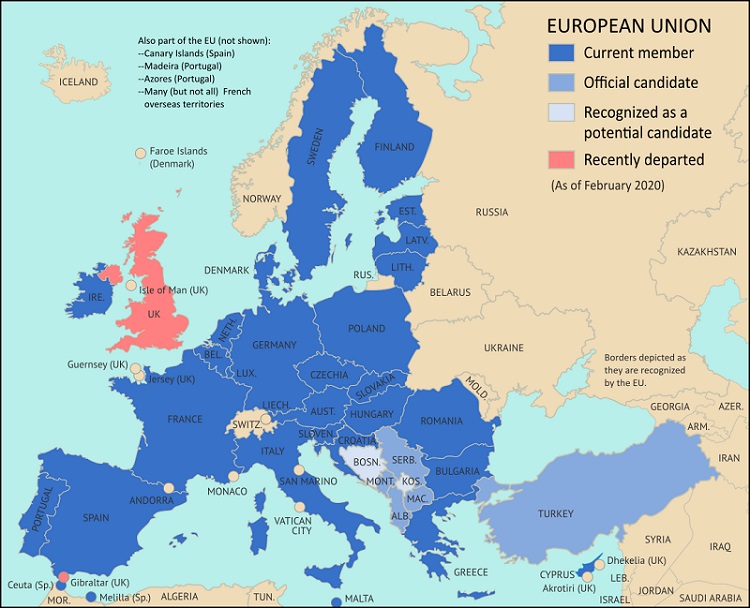International Relations
India-EU Leaders’ Meeting
- 10 May 2021
- 5 min read
Why in News
Recently, Indian Prime Minister participated in the India-European Union (EU) Leaders’ Meeting.
- The meeting was held in a hybrid format with the participation of leaders of all the 27 EU Member States as well as the President of the European Council and the European Commission.
- This is the first time that the EU hosted a meeting with India in the EU+27 format.
- The meeting was the initiative of the Portuguese Presidency of the Council of the EU.
Key Points
- Free Trade Negotiations:
- Agreed to relaunch free trade negotiations by resuming talks that were suspended for the Bilateral Trade and Investment Agreement (BTIA).
- India and EU had launched talks for having a wide-ranging Free Trade Agreement (FTA), officially called broad-based BTIA, long ago in 2007.
- The BTIA was proposed to encompass trade in goods, services and investments.
- However, the talks stalled in 2013 over differences on market access and movement of professionals.
- The EU was India’s largest trading partner in goods 2019-20, ahead of China and the US, with total trade close to USD 90 billion.
- Connectivity Partnership:
- Launched an ambitious and comprehensive ‘Connectivity Partnership’ which is focused on enhancing digital, energy, transport and people-to-people connectivity.
- It is based on the shared principles of social, economic, fiscal, climate and environmental sustainability, and respect for international law and commitments.
- It will catalyse private and public financing for connectivity projects. It will also foster new synergies for supporting connectivity initiatives in third countries, including in the Indo-Pacific.
- Also signed the contract for the second tranche of USD 150 million from the EU for the Pune Metro rail project.
- Launched an ambitious and comprehensive ‘Connectivity Partnership’ which is focused on enhancing digital, energy, transport and people-to-people connectivity.
- Climate Change:
- Reiterated their commitment to achieving the goals of the Paris Agreement and agreed to strengthen joint efforts for mitigation, adaptation and resilience to the impacts of climate change, as well as providing means of implementation including finance in the context of Conference of the Parties (COP 26).
- India welcomed the EU’s decision to join the Coalition for Disaster Resilient Infrastructure (CDRI).
- Reiterated their commitment to achieving the goals of the Paris Agreement and agreed to strengthen joint efforts for mitigation, adaptation and resilience to the impacts of climate change, as well as providing means of implementation including finance in the context of Conference of the Parties (COP 26).
- Technology:
- Agreed to enhance bilateral cooperation on digital and emerging technologies such as 5G, Artificial Intelligence (AI), Quantum and High-Performance Computing including through the early operationalization of the Joint Task Force on AI and the Digital Investment Forum.
- Strengthening Partnership:
- Desired to further strengthen the India-EU Strategic Partnership based on a shared commitment to democracy, fundamental freedoms, rule of law and multilateralism.
- India appreciated the prompt assistance provided by the EU and its member states to combat its second Covid wave.
- India also requested the EU’s support for its joint proposal with South Africa for a Trade Related Aspects of Intellectual Property (TRIPS) waiver on vaccine production-related patents in the World Trade Organisation (WTO).
- Recently, the US has supported the proposal. However, India failed to secure the support of the European leaders.
Way Forward
- India-EU Leaders’ Meeting has set a significant milestone by providing a new direction to the Strategic Partnership and giving a fresh impetus for implementing the ambitious India-EU Roadmap 2025 adopted at the 15th India-EU Summit held in July 2020.
- There is a need for comprehensive trade agreement that brings in strong rules, removes barriers to trade in goods and services and investments and opens up free markets. Addressing the mutual trust deficit, facilitating people’s mobility and connectivity can improve mutual understanding and create opportunities for innovation and growth.
- Enhanced business cooperation between EU and India can diversify their strategic value chains and reduce economic dependency—notably on China.





